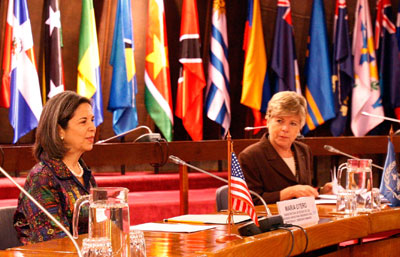Violence and Inequality Restrict Democracy and Cause Poverty and Underdevelopment
Topic(s)
United States Under Secretary of State, María Otero, and the Executive Secretary of ECLAC, Alicia Bárcena, analysed challenges for the region in this area.

(13 January 2012) Today, the Executive Secretary of ECLAC, Alicia Bárcena, and the United States Under Secretary for Civilian Security, Democracy and Human Rights, María Otero, stated that violence and inequality are a cause and consequence of poverty, insecurity and underdevelopment, and at the same time they restrict democracy, freedom and lower the quality of life for the population in Latin America and the Caribbean.
The Under Secretary, Ms. Otero, visited the headquarters of the regional commission of the United Nations in Santiago, Chile, where she gave a magisterial conference entitled "Promoting civil security and strengthening democracy in the 21st century".
In her welcoming statement, the Executive Secretary of ECLAC stated that the countries with significant disparities in income are more likely to be affected by violent crime that more egalitarian societies. However, economic growth, better income distribution and greater transparency help to prevent violence.
"Latin Americans want peace based on democracy, respecting human dignity. We have learnt that protecting our democracies is a job for all," stated Alicia Bárcena.
In this way, and just as was stated in the document Time for equality. Closing gaps, opening trails -which ECLAC presented during its last Session- with regard to democracy, the State must create arenas so that excluded sectors can participate. "It will only be possible to improve security in our countries with more and better States and policies, and better management," she stressed.
As an example, she stated that the cost of violence in Central America (Guatemala, El Salvador, Honduras, Nicaragua and Costa Rica) reached 7.7% of subregional GDP in 2006, taking into consideration the losses in health, public security, justice, private expenditure, material loss and organizational costs.
The United States Under Secretary of State, María Otero, stated that protecting human rights, promoting economic opportunities and developing the judicial system and rule of law are the three fundamental pillars for creating fairer, safer and more prosperous societies.
"The security of citizens will never be achieved without respecting human rights, without economic opportunities and without democratic systems which are constantly being strengthened. The path towards citizen security and democracy in 21st century requires a joint effort between the United States of America and all the countries in the region in order to achieve stronger, safer and better democracies for all of the populations," she declared.
The Under Secretary, Ms. Otero, also referred to the importance of freedom of expression, particularly the need to have free and open Internet access, given that it is one of the key tools for citizen participation.
As for the protection of individual rights, she said that it is vital to prevent discrimination and respect sexual minorities and disabled people. In order to exercise these rights, she also considered that it is very important that citizens can trust their own governments and rule of law.
Finally, in response to a question on how to curb illegal traffic of arms and drugs to the region, Ms. Otero suggested that the United States of America and the Latin American countries need to work together. She also added that it is an urgent issue, which requires many resources and other regions in the world. "We must all join and give this the priority it needs," she said.
See also:
Any queries should be addressed to the ECLAC Public Information and Web Services Section. E-mail: dpisantiago@cepal.org ; Telephone: (56 2) 210 2040.
Follow us on: Twitter, Facebook, Flickr and YouTube.
Country(ies)
-
Uruguay
Contact
Public Information Unit
- prensa@cepal.org
- (56 2) 2210 2040